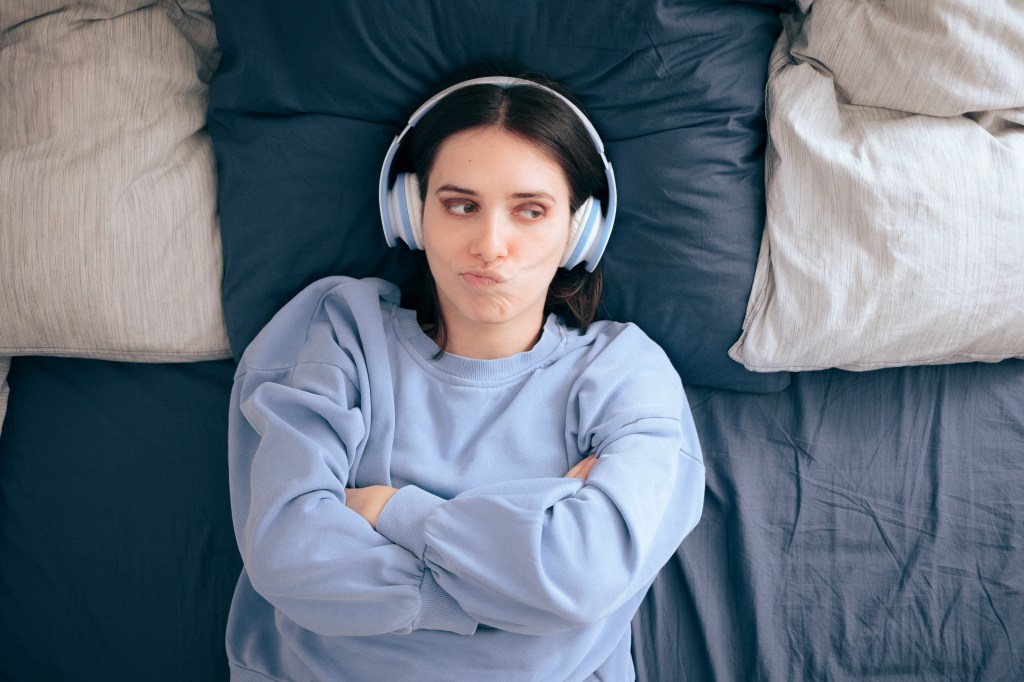Listen up.
Many people rely on headphones that collect the noise to accord for distractions at work, public transport, or during training-but often using technology to allocate your surroundings may be damaging your brain, doctors are now warning.
Five audiology departments within the UK NHS told the BBC that they have seen an increase in young people with hearing issues. After further testing, they have found that the problem is not inside the ear, but is actually caused by a brain problem.

Many of these people are being diagnosed with auditorial processing disorder (APD), a neurological condition that interferes with a person’s ability to process sounds.
Although someone with ADP will go through hearing tests – it means that their ears are functioning as it is thought that – they may have problems deciphering more specific sound elements, such as where a noise comes.
They may also have trouble understanding another person who speaks in a noisy room, or if that person is talking quickly. These people may need repeated things or take more time to respond to the conversation.
“The brain processes these electrical impulses in sounds, then in question, and then in significant sentences and ideas,” neurologist Martin Kutscher, MD, told Adduitde. “Most of us do it without effort. Some adults have problems to convert these neuronal electrical impulses into meaning. We call these problems central hearing processing disorders. “
Other symptoms include problems to remember spoken guidelines, difficulty listening to music or challenges in learning new languages.
APD usually begins in childhood, affecting 2% to 7% of children. It can also affect their ability to read and pronounce. In those cases, it is usually caused by a disease such as a head injury, low birth weight, or chronic ear infections or meningitis – but this increase in young adults with ADP is new.

Claire Benton, vice president of the British Audiology Academy, told the BBC that adult brains can “forget” how to process environmental noise due to the widespread use of headphones.
“You almost created this false environment by wearing those headphones just listening to what you want to hear. You don’t have to work on it,” she said.
All that Chancellor of Noise can make your brain offset, according to David Mcalpine, the academic director of Macquarie University, which can lead to increased empathy and what he calls “loss of hearing”.
“If you have a hearing loss, it’s like changing the encryption of your brain,” he told Kuartz. “Even if you can change what you are listening to, you may not return to the state of the brain you have had before. It’s not reversible.”
“I think we’ve allowed the big technology companies to co-selection our hearing habits, make money and sell it back to us,” Mcalpine said. “Solving them for the problem of hearing is probably the creation of a hearing problem.”
That many young adults have used headphones like these as adolescence is not helping.
“Those more complex, high -hearing skills in your brain just end up developing towards your late teens. So if you are wearing noise removal only and have been in this fake world for your teens of Late, then you are slightly delaying your ability to process speech and noise, ”Benton added.
Some doctors say more research should be done on how headphones that attract noise can affect the brain.
“What does the future look like if we do not investigate this connection?” said audiologist Dr. Angela Alexander, owner of APD Support.
It worries, in particular, about the impact they may have on children whose brains are still developing.
“There are many parents and teachers of good sense who think that the response to children who have noise problems is to wear ear plugs or have headphones that remove noise,” she noted.
There is no cure for APD, and treatment usually involves managing one’s environment. For example, a person with APD may sit closer to the speakers at a working meeting, ask people to speak more slowly or request written information. Speaking therapy can also help.
Doctors have been warning for years that hearing headphones in loud volumes can cause damage to the ears, but this new warning shows that even lower volumes can cause damage, only in another way.
#Doctors #connect #headphones #collect #noise #increased #brain #condition
Image Source : nypost.com